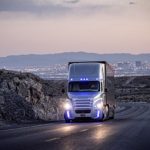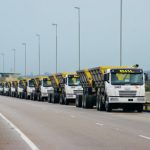The green mile
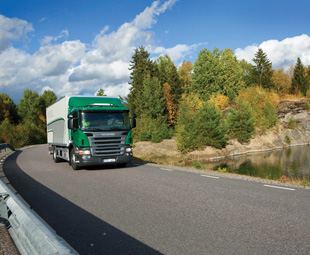
Human-induced greenhouse gases are pushing our planet to its breaking point … The transport industry has stepped up to the plate, however, and is doing its part to mitigate this, with South Africa now getting onto the Euro-6 gas-powered (power)train.
Road transport is doing its part to curb this trend by implementing “cleaner” technologies that run on alternative fuels. This is not a new development as Anthony King, key account manager: alternative fuels at Scania South Africa, explains.
“In terms of development, Scania’s historical data of sustainable energy goes all the way back to 1916, when we developed our first ethanol engine. In 1929, Scania developed its first gas engines …”
There are also ample examples of engines that ran on steam and paraffin throughout the ages. Unfortunately, fossil fuels won the mobility war and development of these “alternative” engines took a back seat – until people realised that, although machines running on fossil fuels ain’t broke, they do need fixing …
 “Looking at the future, climate change is one of the main criteria pushing the need for alternative fuel technology,” says King. “We’re all occupying one planet and climate change has an effect on all of us.”
“Looking at the future, climate change is one of the main criteria pushing the need for alternative fuel technology,” says King. “We’re all occupying one planet and climate change has an effect on all of us.”
It’s no wonder that improved engines running on alternatives re-entered the spotlight … “Scania’s biofuel technology is available here and now,” King points out. “It is, however, fairly new in South Africa and on the African continent.”
Scania is changing this, however. “We offer engines that run on 100 percent bioethanol, biodiesel and biogas to reduce greenhouse gases and running costs,” King tells FOCUS. “Basically, we take our diesel engine and, through our modular system, ensure that it complies.”
He continues: “We offer two engines in the gas department; one that runs on compressed natural gas (CNG) or biogas, which is normally used for inner-city operations; and another that runs on liquefied natural gas, which is used for longer distances.”
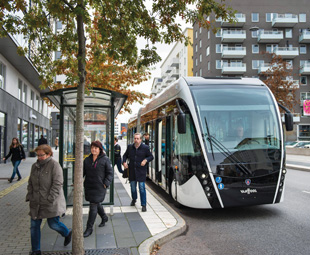 The gas derivatives are also available in Euro-6 specifications. These will be gracing the South African transport scene from this May onwards … “This month we will receive the first ten Euro-6 CNG buses for Unitrans, which has seen the need for vehicles that run on alternative fuels and partnered with us,” says King.
The gas derivatives are also available in Euro-6 specifications. These will be gracing the South African transport scene from this May onwards … “This month we will receive the first ten Euro-6 CNG buses for Unitrans, which has seen the need for vehicles that run on alternative fuels and partnered with us,” says King.
The vehicles, sporting Scania’s nine-litre, 208 kW (280 hp) Euro-6 gas engine, will be used in Virginia, in the Free State, to transport workers to and from a mine. “These vehicles are very significant to the South African transport industry, as they will create awareness and show government and other industry players that this can be done,” King emphasises.
These vehicles also need to have the right standard of fuel … “One needs to make sure that you develop the standard,” King points out. “At the end of the day, that’s what everyone is looking for – to ensure that vehicles are operating and can be fuelled with the appropriate fuel. They will also look at how the service intervals are managed.”
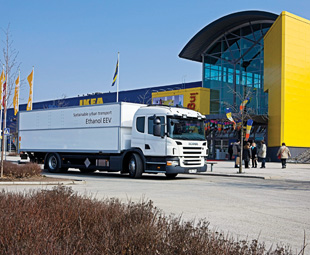 King continues: “Regarding infrastructure development, Molopo Exploration will be supplying us with the gas and it is also looking at putting in a filling facility in Bloemfontein.” The company will expand these facilities to other cities in the country as soon as vehicle numbers justify it.
King continues: “Regarding infrastructure development, Molopo Exploration will be supplying us with the gas and it is also looking at putting in a filling facility in Bloemfontein.” The company will expand these facilities to other cities in the country as soon as vehicle numbers justify it.
“There is a definite mind shift taking place in the South African transport industry, especially on the bus tender side. People are now asking for alternative fuels,” King points out. “Scania is also receiving requests for vehicles running on alternative fuel from the waste management segment.”
This technology is available here and now. More industry players need to step up and embrace it. “We need to partner with like-minded people looking for sustainable solutions and, obviously, enter into discussions with government about how support for these types of fuels will be implemented,” says King. “It is about looking at these sustainable solutions and making sure that – for South Africa – there is an alternative in place.”
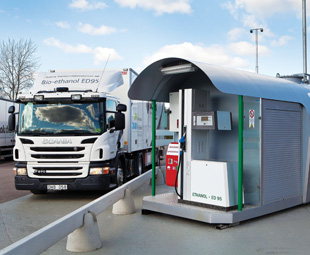 He continues: “When one looks at alternative technology, it is not about saying that you must have all the vehicles on sustainable or green technology – that would be utopia for sure – but it will definitely make a difference if there is a percentage of vehicles, or a small requirement in tenders, which can grow over time.”
He continues: “When one looks at alternative technology, it is not about saying that you must have all the vehicles on sustainable or green technology – that would be utopia for sure – but it will definitely make a difference if there is a percentage of vehicles, or a small requirement in tenders, which can grow over time.”
Scania is also continually progressing with its green developments. “Looking at future technology, from a European perspective, we have driverless vehicles and we’re looking at platooning – where
you can reduce drag as vehicles operate very close to each other. We are also busy with inductive wireless technology in ‘electrified roads’, where the vehicles
can be charged by driving over a wireless pad.”
King adds that these developments are taking place in Sweden, and will then be expanded into other areas. “We’re not sitting still; we are definitely looking at all the options that we can utilise for a greener tomorrow.”
Published by
Focus on Transport
focusmagsa

